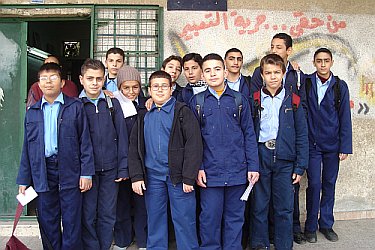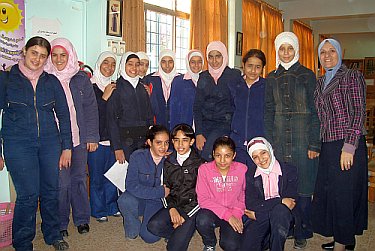Teaching English in Damascus
February 11, 2009
Junior Meher R. Makda's fall semester internship gave her the opportunity to work in Damascus, Syria, with the United Nations Relief and Works Agency for Palestine Refugees in the Near East (UNRWA). Established in 1949 following the 1948 Arab-Israeli War, UNRWA has provided millions of Palestinian refugees throughout the Near East—4.6 million are currently registered—with education, healthcare, economic assistance and social services. While with the agency, Makda wrote project proposals for its Violence-free Schools campaign, taught English at six elementary schools, and drafted press releases, including a November story for the United Nation's Web site.
Having been raised in Pakistan and now attending college at DePauw, Makda can claim to have learned about conflict in the Middle East from, quite literally, both sides of the issue. With the hope of undertanding more about the troubled region, she decided that the differing perspectives to which she'd been exposed could only be reconciled through firsthand experience.
"I have always been interested in world politics," says Makda, "especially the Palestine-Israel issue. Growing up in Pakistan, I was exposed to just one side of the issue. After coming to DePauw, I realized that some people felt very differently.  Since I didn't want to take just anyone's word for any of it, I decided I needed to go see things for myself. I was first offered an internship in Jerusalem, but because I have a Pakistani passport I am not allowed to enter Israel. Fortunately, a place in UNRWA's education department in Damascus opened up during the summer. Everything came together at the very last moment. If it hadn't been for all the DePauw professors who helped me through the process, this internship would not have been possible."
Since I didn't want to take just anyone's word for any of it, I decided I needed to go see things for myself. I was first offered an internship in Jerusalem, but because I have a Pakistani passport I am not allowed to enter Israel. Fortunately, a place in UNRWA's education department in Damascus opened up during the summer. Everything came together at the very last moment. If it hadn't been for all the DePauw professors who helped me through the process, this internship would not have been possible."
Makda initially struggled to form relationships with the people she met. She was regularly occupied with creating work for herself; full-time internships with UNRWA were recently created and interns often struggle to define their duties. Even simple communication was difficult. Makda didn't understand Arabic, and most of the Syrians and Palestinians she encountered didn't speak English. Nevertheless, she slowly found ways to connect with the people she had traveled to help.
"Sometimes, humans can develop relationships and connections that transcend all the blockades created by religion, culture, language and customs," says Makda. "If I was willing to be patient and showed genuine interest, people opened up to me, and I really understood where they were coming from. If children liked me, they opened up even more than the adults. The children loved foreigners and would get really excited about the English club.  They would give me notes and presents, and even the ones I did not teach would come to shake hands with me. I almost felt like a celebrity, though it made me realize how ‘closed' their society is. I also had to be very careful about what I said and did because it really did make a big impression on the children. One day, a girl came up to me and showed me her ear piercing. She said she did it because she wanted to be like me. That is one of the nicest things anyone has ever said to me!"
They would give me notes and presents, and even the ones I did not teach would come to shake hands with me. I almost felt like a celebrity, though it made me realize how ‘closed' their society is. I also had to be very careful about what I said and did because it really did make a big impression on the children. One day, a girl came up to me and showed me her ear piercing. She said she did it because she wanted to be like me. That is one of the nicest things anyone has ever said to me!"
With her time in Damascus behind her, Makda, who is currently studying abroad at Oxford University, says that solutions to conflict in the Near East are no more evident to her now than they had been before the internship. "When I left for Syria, I did not fully understand the Palestine-Israel conflict. My experience in Damascus made me realize that the underlying issues are very complex and sensitive, and there is too much that I do not understand. But, especially after spending time with children and their families, I am even more convinced that violence and war should never be used."
Makda's own future, however, became much clearer because of the experience.
"I realized that I really want to work with children in conflict-ridden areas in the future. I have learned so much from my friends, colleagues, students and even mere acquaintances in Syria that my outlook on life has changed quite a bit."
Karen Koning AbuZayd, a 1963 graduate of DePauw, has served as the agency's commissioner-general since she was appointed in 2005 by former United Nations Secretary-General Kofi Annan.
Back